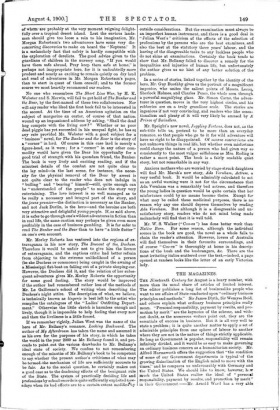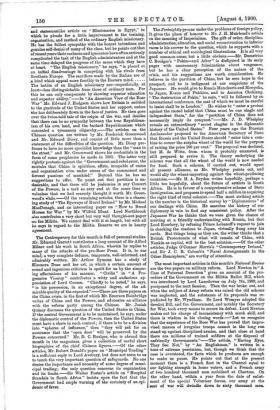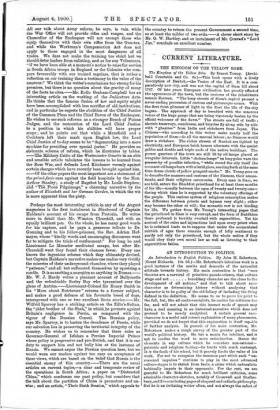THE MAGAZINES.
ME Nineteenth Century for August is a heavy number, with more than its usual share of articles of limited interest. The editor publishes a long list of businesslike people who want to see affairs of State conducted upon "ordinary business principles and methods." Sir James Blyth, Sir Wemyss Reid, and others explain what ordinary business principles really mean. "Personal responsibility, payment by results, and pro- motion by merit" are the keynotes of the scheme, and with- out doubt, as the numerous writers 'point out, they are the essentials of success in business. But it is all very well to state a problem ; it is quite another matter to apply aset of admirable principles from one sphere of labour, to another where they are not in the nature of things strictly applicable. So long as Government is popular, responsibility will remain infinitely divided, and it would be as easy to make governing an ordinary business concern as a humanitarian society. Mr. Alfred Harmsworth offers the suggestion that "the -condition of some of our Government departments is typical of the - growing disinclination of the 'English mind to move with the times," and he compares us unfavourably with Germany and the United States. We should like to know, however; hcw much the United States realise the ideal of "personal responsibility, payment by results, and promotion by merit" in 'their Goi-ernment.—Mr. Arnold Ward has a very able
and statesmanlike article on "Missionaries in Egypt," in which he pleads for a little improvement in the training, organisation, and method of the ordinary English missionary. He has the fullest sympathy with the honest intentions and genuine self-denial of many of the class, but he points out that of recent years their rashness and ignorance have often seriously complicated the task of the English administrators and at the same time delayed the progress of the cause which they have at heart. 'The English missionary," he says, "is placed at an initial disadvantage in competing with his rivals from Southern Europe. The sacrifices made by the Italian are of .a kind which appeal more forcibly to the Eastern mind The habits of an English missionary are—superficially, at least—less distinguishable from those of ordinary men. For this he can only compensate by showing superior education and superior ability."—In "An American View of the Boer War" Mr. Edward J. Hodgson shows how Britain is entitled to the gratitude of the United States and her support, unless she has deliberately flown in the face of justice. He then goes over the twice-told tale of the origin of the war, and decides that there can be no sympathy between the true Republican- ism of his own land, and the bastard Republicanism which concealed a tyrannous oligarchy.—The articles on the Chinese question are written by Mr. Frederick Greenwood and Mr. Edward Dicey, and consist of little more than a statement of the difficulties of the question. Mr. Dicey pro- fesses to have no more specialist knowledge than the "man in the street," and Mr. Greenwood shows his credentials in the form of some prophecies he made in 1891. The latter very rightly protests against the " Government-and-rebel etror, the mistake that China is spiritless, effete, incapable of union and organisation even under stress of the commonest and fiercest passions of mankind." Beyond this he has no suggestions to offer. To point out that partition is tin- 'desirable, and that there will be jealousies in any Concert of the Powers, is a task so easy and at the same time so valueless that we had scarcely thought it worth Mr. Green- wood's while.—Of the remaining articles, there is a charm- ing study of "The Byeways of Rural Ireland" by Mr. Michael MaoDonagh, and an interesting paper on "How to Breed Horses for War" by Mr. Wilfrid Blunt. Lord Northbrook also contributes a very short but very well thought-out paper on the Militia We cannot deal with it at length, but with all he says in regard to the Militia Reserve we are in hearty agreement.
The Contemporary for this month is full of personal studies. Mr. Edmund Garrett contributes a long account of Sir Alfred litilner and his work in South Africa, wherein he replies to many of the attacks of the pro-Boer Press. It is, to our mind, a very complete defence, temperate, well-informed, and admirably written. Mr. Arthur Symons has a study of Eleonora, Dime and her art, in which a certain amount of sound and ingenious criticism is spoilt for US by the simper- ing affectations of his manner. " Civilis " in "A Pro- gressive Viceroy" contributes a witty and audacious ap- preciation of Lord Curzon. "Chiefly to be noted," he says, "is his possession, in an exceptional degree, of the ad- mirable quality of the expected."—There are three papers on the China crisis, in the first of which Mr. Emerson Bainbridge writes of China and the Powers, and advocates an alliance with the reform party among the Chinese. Mr. Josiah Quincy discusses the question of the United States in China If the central Government is to be maintained, he says, under the diplomatic control of the Powers, then the United States mint have a share in such control ; if there is to be a division into "spheres of influence," then "they will ask for an assurance that the 'open door' will be preserved by the Powers concerned." Mr. D. C. Boulger, who is abroad this month in the magazines, gives a collection of useful short biographies of the chief Chinese figures.---Of the other articles, Mr. Robert Donald's paper on "Municipal Trading" is a sufficient reply to Lord Avebury, but does not seem to us to touch the very important question of safeguards. No one denies the importance and necessity of some degree of muni- cipal trading; the only question concerns its organisation and its limits.—Sir Walter Foster's article on "Hospital Scandals in South Africa" insists upon the fact that the Government had ample warning of the certainty of an epi- demic of fever. The Fortnightly groans under the problems of foreign policy. It gives the place of honour to Mr. J. H. Muirheacl's article on the meaning of Imperialism. The gift of order, discipline, administration, education, and social reconstruction to inferior races is his answer to the question, which he supports with a number of ethical and sociological illustrations. It is all very good common-sense, but a little obvious.—Mr. Demetrius C. Boulger's "Pekin—and After" is disfigured in its early pages with unnecessary fulminations about vengeance, but he has a clear perception of the nature of the crisis, and his suggestions are worth consideration. He believes in the partition of China, but he sees hope in the prospect, and he is indignant at our suspicions of the Japanese. He would give to Russia Manchuria and Mongolia, to Japan, Korea and Fuhkien, and to America Chekiang. "The destruction of Pekin," he says, "will be followed by an international conference, the seat of which we must be careful to insist shall be in London." He wishes to "enter a protest against the rooted belief that China must be one single and independent State," for the "partition of China does not necessarily imply its conquest."—Mr. J. D. Whelpley reveals an extraordinary "secret chapter in the diplomatic history of the United States." Four years ago the Russian Ambassador proposed to the American Secretary of State that Russia and the United States should "enter into a com- bine to corner the surplus wheat of the world for the purpose of raising the price 100 per cent." The proposal was declined, but M. de Witte, from whom it probably emanated, is still prepared to revive it. The theory underlying the scheme was that all the wheat of the world is now needed for food. Such a scheme, if carried out, would upset all present alliances, as Mr. Whelpley points out, and would ally the wheat-importing against the wheat-producing countries.—Mr. H. A. Bryden writes hopefully, perhaps a little too hopefully, about the future of settlers in South Africa. He is in favour of a comprehensive scheme of State immigration, and proposes to spend half a million in acquiring the right kind of rural colonist.—The most striking article in the number is the historical survey by " Diplomaticus" of our dealings with China. He searches the history of our diplomacy in vain to find any oonsistent policy. After the Japanese War he thinks that we were given the chance of arriving at a friendly understanding with Russia, but that Lord Rosebery, by refusing Prince Lobanoff's request to join in checking the cessions to Japan, virtually flung away his cards. But things being as they are, the writer thinks that a British Protectorate of what will remain of China, with Nankin as capital, will be the best solution.—Of the other articles, Judge O'Connor Morris's "Contemporary Ireland," and Sir J. C. R. Colomb's "Naval Arrangements in the Other Hemisphere," are worthy of attention.
The most important articles in this month's National Review are the two papers on military reform. Lord Newton in" A Case of Paternal Desertion" gives an account of the pro- cedure of the Government on the Militia Ballot Bill, which was introduced by Lord Lansdowne on July 7th, 1899, and postponed to the next Session. Then the war broke out, and when the subject of Army reform was raised the old scheme was neglected, and the substance of its proposals was re- pudiated by Mr. Wyndham. So Lord Wemyss adopted the derelict Bill, and the Government, and notably the Secretary for War, took every means to secure its defeat. Lord Newton makes out his charge of inconsistency with much skill, and there is wisdom in his closing words :—" Let us recognise that the experience of the Boer War has proved that impro- vised masses of irregular troops cannot in the long run stand up against disciplined armies, and that close at hand there are millions of trained soldiers at the disposal of unfriendly Governments."—The article, "Having Eyes, They See Not," by "An Englishman," is written in a tone of extreme pessimism, but, though we think that the case is overstated, the facts which he produces are enough to make us pause. He points out that at the present moment there is a French fleet in the Channel equal to our fighting strength in home waters, and a French army of two hundred thousand men mobilised at Chartres. On the other hand, within a year from the date of enlist- ment of the special Volunteer forces, our army at the seat of war will dwindle down to sixty thousand men. All our talk about Army reform, he says, is vain while the War Office will not provide rifles and ranges, and the Chancellor of the Exchequer will not exempt those who equip themselves with their own rifles from the Guntax, and while the Workman's Compensation Act does not apply to those engaged in the most dangerous a all trades. We dare not make the training too strict lost we should deter loafers from enlisting, and as for our Volunteers, "if we have been able at a moment's notice to raise for service in South Africa, troops in England or the Colonies who com- pare favourably with our trained regulars, that is rather a reflection on our training than a testimony to the value of the amateur?? We think the writer's conclusions too strong for his premises, but there is no question about• the gravity of many of the facts he cites.—Mr. Rollo Graham-Campbell has an interesting article on the working of the Judicature Acts. He thin.ka that the famous fusion of law and equity might have been accomplished with less sacrifice of old institutions, and in particular he regrets the abolition of the Chief Justice of the Common Pleas and the Chief Baron of the Exchequer. He wishes to see such reforms as a stronger Bench of Puisne Judges, and the restoration of the Lord Chief Justice to a position in which his abilities will have proper scope ; and he points out that while a Mansfield and a Cockburn left their mark upon English law, the Lord Chief Justice of to-day seems to be "degenerating into a mere machine for presiding over special juries." He provides an elaborate. scheme of reform, which he illustrates by tables. --The Military.Critic of the Westimi92ster Gazette-in an able and sensible article tabulates the lessons to be learned from the Boer War, and defends Lord Kitchener warmly against certain charges which have recently been brought against him.
Of the other papers the most important are a statement of the piimd-facie case against the field hospitals by the Hon. Arthur Stanley; a study of Bagehot by Mr. Leslie Stephen; ina "The Pious Pilgrimage," a cha.rming narrative by the author of Elizabeth and her German Garden, in which the wit is more apparent than the piety.
Perhaps the most interesting article in any of the August magazines is the first instalment in Blackwood of Captain 4aldane's account of his escape from Pretoria. He writes more in detail than Mr. Winston Churchill, and with an equally brilliant pen. On the whole, he has many good words for his captors, and he pays a generous tribute to Dr. Gunning and to his fellow-prisoner, the Rev. Adrian Hof- meyer, whose "kindly words and encouraging discourses went far to mitigate the trials of confinement." For long he and Lieutenant Le Mesurier meditated escape, but after Mr. Churchill went they found their chances fewer. Every one knows the ingenious scheme which they ultimately devised, but Captain Haldane's narrative makes one realise very vividly the miseries of their underground chamber, where they played "patience," and all but suffocated themselves by upsetting a candle. It is as exciting a narrative as anything in Dumas.
Mr. W. J. Hardy writes a pleasant account of Ballycastle and the redoubtable Sorley Boy who tyrannised over the glens of Antrim.—Lieutenant-Colonel Sir Henry Smith in his "More about Retrievers" returns to a former subject, and makes a good defence of his favourite breed of dogs, interspersed with one or two excellent Scots stories.—Mr. Wilfrid Sparroy has a striking article on the Zillu's-Sultan, the "elder brother of the Shah," in which he protests against Britain's negligence in Persia, as compared with the vigour of the Russian Consul. The Russian policy, says Mr. Sparroy, is to hasten the decadence of Persia, while our salvation lies in preserving the territorial integrity of the country. He wishes us to remember that there rules as Governor-General of Isfahan a Persian Imperial Prince whose policy is progressive and pro-British, and that it is our duty to support him and not bully him at the instance of Russia. We cannot argue the Persian question here, but we would warn our readers against too easy an acceptance of these views, which are based on the belief that Russia is the essential enemy of this country.—There are the usual articles on current topics,—a clear and temperate review of the operations in South Africa; a paper on "Distracted China," which condemns our past policy, but considers that the talk about the partition of China is premature and tin- wise; and an article, "Their Sixth Session," which appeals to the country to return the present Government a second time, as at least the milder of two evils.—A clever short story by Mr. G. W. Hartley, and an instalment of Mr. Conrad's "Lord Jim," conoinde an excellent number.




































 Previous page
Previous page